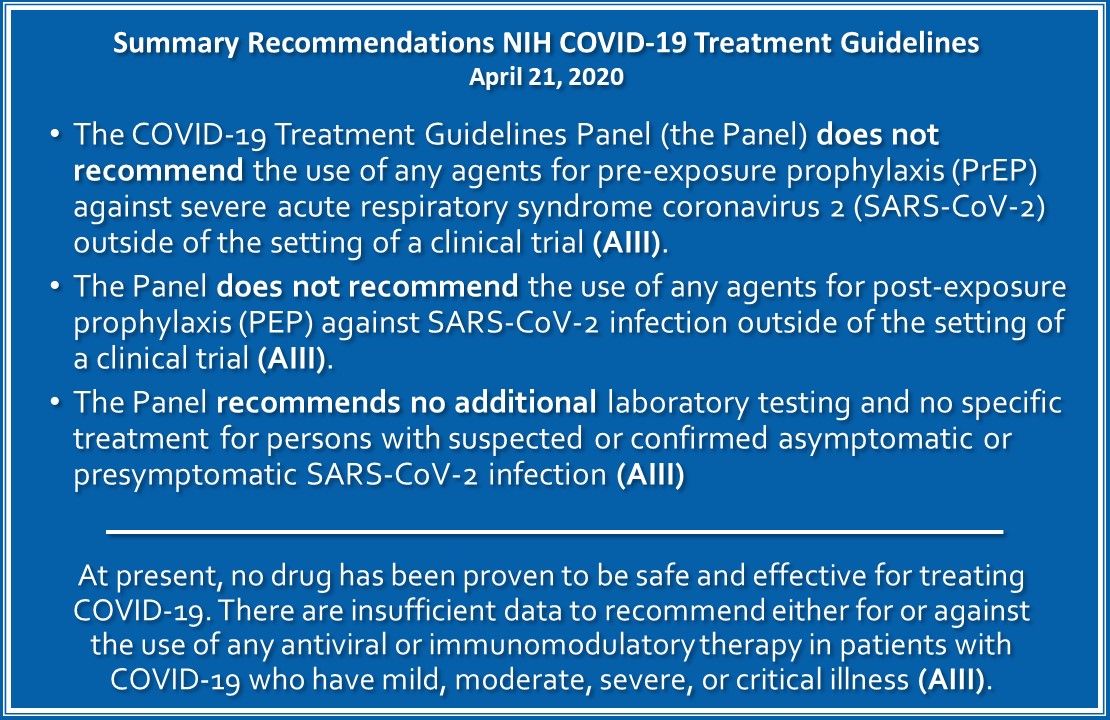- Clinical Technology
- Adult Immunization
- Hepatology
- Pediatric Immunization
- Screening
- Psychiatry
- Allergy
- Women's Health
- Cardiology
- Pediatrics
- Dermatology
- Endocrinology
- Pain Management
- Gastroenterology
- Infectious Disease
- Obesity Medicine
- Rheumatology
- Nephrology
- Neurology
- Pulmonology
New NIH COVID-19 Treatment Guidelines, No Approved Drugs
There is no pharmacologic agent proven to be safe and effective for treating COVID-19, according to guidelines compiled by an NIH-assembled panel of experts.

Guidelines issued on April 21, 2020 by the National Institute of Allergy and Infectious Diseases state that there is no pharmacologic agent proven to be safe and effective for treating COVID-19, the disease caused by the SARS-CoV-2 virus.
Specifically, the guidelines state:
"There are no Food and Drug Administration (FDA)-approved drugs specifically to treat patients with COVID-19. Although reports have appeared in the medical literature and the lay press claiming successful treatment of patients with COVID-19 with a variety of agents, definitive clinical trial data are needed to identify optimal treatments for this disease."
Current recommendations for clinical management of patients with COVID-19 focus on prevention and control measures and supportive care for those with severe or critical illness. Treatment decisions, the guidelines state, are ultimately the province of patient and healthcare provider.
The guidelines are intended for use by healthcare providers and are based on available published and preliminary data and the clinical expertise of the participating panelists-a group including US physicians with frontline COVID-19 clinical experience, statisticians, members of federal agencies, healthcare and academic organizations, and professional societies, according to an NIH press release.
Treatments under investigation
Under investigational therapies the guidelines summarize 2 broad categories of treatments being used empirically by clinicians: antivirals, which directly target the coronavirus, and host modifiers and immunomodulators, which may either influence a patient’s immune response to the virus or target the virus.
About the widely publicized drugs chloroquine and hydroxychloroquine for treatment of COVID-19, the panel states the data are insufficient to recomend either for or against their use; if used, patients must be monitored closely for adverse cardiac effects. And, except in the context of a clinical trial, the Panel recommends against the use of the combination of hydroxychloroquine and azithromycin (toxicities) and lopinavir/ritonavir (AI) or other HIV protease inhibitors based on negative clinical trial data.
About the antiviral remdesivir, for which cohort analysis data were recently published, the guidelines find current data insufficient to recommend for or against use of the investigational drug; during ongoing clinical trials, the drug is being made available through compassionate use programs for specific patient populations.
About the efficacy of convalescent plasma and interleukin inhibitors, clinical trial data also are deemed insufficient to recommend either for or against either and the Panel recommends against use of immunomodulators (eg, interferon, Janus kinase inhibitors) except in the context of clinical trials.
Testing, evaluation, risk stratification
- The guidelines include the CDC’s priority system for diagnostic testing for SARS-CoV-2 based on availability of tests, with hospitalized patients and symptomatic healthcare workers first, followed by patients in long-term care facilities, aged ≥65 years, among others, and then in COVID-19 hot spots, critical infrastructure workers, first responders, etc.
- Recommendations for evaluation, patient stratification based on severity of illness, and best practices for managing patients at different states of infection range from outpatients who are either asymptomatic or who have mild to moderate symptoms and are self-isolating to inpatients with severe illness or critical disease.
- A comprehensive section provides multiple considerations for clinicians caring for the most critically ill hospitalized patients, including recommendations for patients needing hemodynamic and ventilatory support, and drug therapy.
- There is a detailed section on use of concomitant medications-including whether to continue or discontinue the drugs and when. These include statins; corticosteroids; non-steroidal anti-inflammatory drugs; and the antihypertensive agents ACE inhibitors and ARBs.
_____________________________________________________________
The treatment guidelines panel is co-chaired by Roy M. Gulick, MD,chief, Infectious Disease Division, Weill Medical Hospital of Cornell University, New York City; H Clifford Lane, MD, clinical director, National Institute of Allergy and Infectious Diseases, National Institutes of Health; and Henry Masur, MD, chief, Critical Care Medicine Department, NIH Clinical Center.
The guidelines are available online and will be updated regularly as data are published in peer-reviewed literature and as other authoritative guidance develops.
